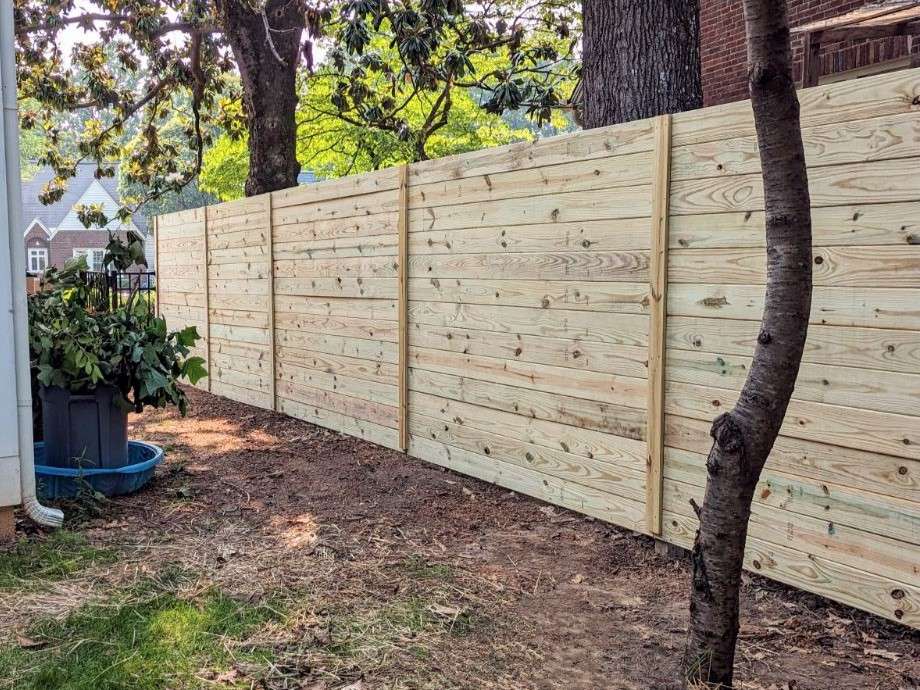All Categories
Featured
Mounting a fence on your residential property can include privacy, protection, and aesthetic charm, yet before you begin digging holes and establishing posts, it's vital to understand whether you need a permit. The sort of fence you prepare to set up, where it will be placed, and regional zoning laws can all affect the permitting procedure. Not obtaining the necessary authorizations could cause penalties or the requirement to get rid of the fencing. Below's what you require to know to make sure a smooth installation process.
Why Are Allows Essential for Fencing Installment? Licenses are essential for ensuring that your fence abides by local zoning regulations and building codes. These guidelines aid ensure the safety and security of your property and the surrounding area. In addition, permits avoid conflicts with neighbors or regional authorities, especially when it involves residential or commercial property lines, height constraints, and overall layout.
In a lot of cases, local authorities call for permits to manage points like visibility at intersections or the closeness of a fence to public areas like roads or sidewalks. Authorizations likewise help make certain that fences are mounted appropriately and securely, especially when it comes to distinct materials or high fences.
Typical Sorts Of Permits for Fencing Setup. The sort of fence you want to set up and your place will determine which authorizations are required. Here are one of the most typical kinds:
Structure License. A structure permit is usually required for fences that go beyond certain height restrictions (commonly over 6 feet), lie near a public roadway or sidewalk, or are made from specific materials. Building permits guarantee that the framework fulfills neighborhood structure codes, including security standards.
Zoning Permit. Zoning licenses are frequently needed to make certain that your fence conforms with local zoning regulations. Zoning regulations can specify where a fence can be put on your home (e.g., along residential or commercial property lines or ahead backyards), along with established limitations on fence elevation. These regulations are created to avoid obstructions that can influence traffic safety or area appearances.
![]()
Problem Authorization. In some areas, you might require a trouble authorization to place your fence a specific distance from building utilities, roads, or lines. Troubles are planned to preserve proper room between structures and building boundaries, minimizing potential problems with next-door neighbors or public facilities.
Homeowners Association (HOA) Authorization. You will likely require authorization from the HOA prior to installing a fence if your property is component of a community regulated by a Homeowners Association (HOA) HOA guidelines typically regulate the design, height, products, and also shade of fencings, ensuring that they match the total visual of the neighborhood.
The Process for Getting a Fencing License. To acquire a fencing license, you usually need to call your neighborhood city or area workplace. Most areas have a structure division or planning workplace where you can obtain authorizations. The process includes completing an application and giving detailed details regarding your recommended fence, consisting of:
Fencing design (materials, elevation, style) Place on the home. Property line information (for exact placement) In most cases, a website plan revealing the recommended fencing's position will be required. You may likewise require to pay a license cost, which can vary based upon location and the complexity of the task.
Once you submit your application, the local authorities will review it to guarantee the fence complies with local guidelines. Depending on your location, you may likewise require to schedule an inspection or permit for a property study.
When Do You Not Required an Authorization? Sometimes, an authorization may not be called for. Commonly, you could not need an authorization if:
![]()
The fence is under a particular height (frequently 3-4 feet for front backyards) You're replacing an existing fencing with the same kind and elevation. The fencing is short-lived (such as a garden fence) It's constantly a good idea to examine with your local structure or zoning department to confirm the requirements, as policies can vary.
Effects of Not Getting an Authorization. Falling short to get the necessary authorizations can lead to various issues. One of the most typical repercussion is being fined or asked to eliminate the fencing. In many cases, you might require to re-install the fencing according to code, which might be pricey and lengthy. In addition, not adhering to the appropriate permitting procedure can produce troubles with next-door neighbors, particularly if your fencing extends beyond your residential property line or doesn't meet height or layout needs.
Verdict. Prior to mounting a fence, make sure you're aware of the regional guidelines and whether you need a license. By acquiring the correct licenses, you'll make sure that your fence is lawfully compliant, secure, and complimentary from future difficulties.
Why Are Allows Essential for Fencing Installment? Licenses are essential for ensuring that your fence abides by local zoning regulations and building codes. These guidelines aid ensure the safety and security of your property and the surrounding area. In addition, permits avoid conflicts with neighbors or regional authorities, especially when it involves residential or commercial property lines, height constraints, and overall layout.
In a lot of cases, local authorities call for permits to manage points like visibility at intersections or the closeness of a fence to public areas like roads or sidewalks. Authorizations likewise help make certain that fences are mounted appropriately and securely, especially when it comes to distinct materials or high fences.
Typical Sorts Of Permits for Fencing Setup. The sort of fence you want to set up and your place will determine which authorizations are required. Here are one of the most typical kinds:
Structure License. A structure permit is usually required for fences that go beyond certain height restrictions (commonly over 6 feet), lie near a public roadway or sidewalk, or are made from specific materials. Building permits guarantee that the framework fulfills neighborhood structure codes, including security standards.
Zoning Permit. Zoning licenses are frequently needed to make certain that your fence conforms with local zoning regulations. Zoning regulations can specify where a fence can be put on your home (e.g., along residential or commercial property lines or ahead backyards), along with established limitations on fence elevation. These regulations are created to avoid obstructions that can influence traffic safety or area appearances.

Problem Authorization. In some areas, you might require a trouble authorization to place your fence a specific distance from building utilities, roads, or lines. Troubles are planned to preserve proper room between structures and building boundaries, minimizing potential problems with next-door neighbors or public facilities.
Homeowners Association (HOA) Authorization. You will likely require authorization from the HOA prior to installing a fence if your property is component of a community regulated by a Homeowners Association (HOA) HOA guidelines typically regulate the design, height, products, and also shade of fencings, ensuring that they match the total visual of the neighborhood.
The Process for Getting a Fencing License. To acquire a fencing license, you usually need to call your neighborhood city or area workplace. Most areas have a structure division or planning workplace where you can obtain authorizations. The process includes completing an application and giving detailed details regarding your recommended fence, consisting of:
Fencing design (materials, elevation, style) Place on the home. Property line information (for exact placement) In most cases, a website plan revealing the recommended fencing's position will be required. You may likewise require to pay a license cost, which can vary based upon location and the complexity of the task.
Once you submit your application, the local authorities will review it to guarantee the fence complies with local guidelines. Depending on your location, you may likewise require to schedule an inspection or permit for a property study.
When Do You Not Required an Authorization? Sometimes, an authorization may not be called for. Commonly, you could not need an authorization if:

The fence is under a particular height (frequently 3-4 feet for front backyards) You're replacing an existing fencing with the same kind and elevation. The fencing is short-lived (such as a garden fence) It's constantly a good idea to examine with your local structure or zoning department to confirm the requirements, as policies can vary.
Effects of Not Getting an Authorization. Falling short to get the necessary authorizations can lead to various issues. One of the most typical repercussion is being fined or asked to eliminate the fencing. In many cases, you might require to re-install the fencing according to code, which might be pricey and lengthy. In addition, not adhering to the appropriate permitting procedure can produce troubles with next-door neighbors, particularly if your fencing extends beyond your residential property line or doesn't meet height or layout needs.
Verdict. Prior to mounting a fence, make sure you're aware of the regional guidelines and whether you need a license. By acquiring the correct licenses, you'll make sure that your fence is lawfully compliant, secure, and complimentary from future difficulties.
Latest Posts
Don’t Miss Special Auto Repair Specials in Chicago at Montclare Auto Repair
Published May 25, 25
1 min read
Safeguard Your Investment with Professional Gutter Installment
Published May 22, 25
1 min read
Discover the Storied Past of Deauville Inn: From Speakeasy to Seafood Haven
Published May 20, 25
2 min read
More
Latest Posts
Don’t Miss Special Auto Repair Specials in Chicago at Montclare Auto Repair
Published May 25, 25
1 min read
Safeguard Your Investment with Professional Gutter Installment
Published May 22, 25
1 min read
Discover the Storied Past of Deauville Inn: From Speakeasy to Seafood Haven
Published May 20, 25
2 min read